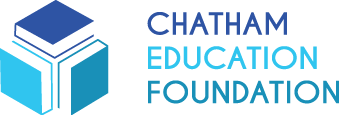Grants from the Oak Foundation and the North Carolina GlaxoSmithKline Foundation have positioned up to 200 rising kindergarteners in Chatham County for a jump on their upcoming 13 years of school. Chatham Education Foundation (CEF) secured the funds and partnered with Chatham County Schools (CCS) for the district’s inaugural Kindergarten Readiness Camp, which for some students will be their first formal educational setting.
All children are not afforded opportunities to begin their learning journeys in preschool, where students are able to get acclimated emotionally and socially to attending school. Kindergarten Readiness Camp, from July 30-Aug. 16, is a free, three-week, half-day program that includes breakfast, lunch and transportation to and from sites at Virginia Cross, Pittsboro, J.S. Waters and North Chatham elementary schools.
“We are so grateful to Chatham Education Foundation, Oak Foundation and GlaxoSmithKline for their generous support of our district and our students. This program has been a dream for a few years, and it is exciting to see our collective vision come to reality,” said Dr. Amanda Hartness, the district’s assistant superintendent for academic services and instructional support.
Students show up for kindergarten at various levels of academic ability. Just 53 percent of students entering CCS are equipped with basic literacy skills. Some arrive not even knowing the alphabet, Hartness said. That widens the achievement gap wherein students with strong academic foundations make progress in the classrooms while their less-prepared counterparts struggle to catch up. Kindergarten Readiness Camp aims to close that gap, program coordinator Sherry Elmore said.
“Our goal is to teach expectations and procedures that students will encounter in kindergarten,” Elmore said. “If students understand what is expected of them, then our hope is they will be able to focus more on academics being taught rather than how to navigate school.”
“As a community, we are dedicated to having 80 percent of Chatham County Schools third-grade students reading on grade level by 2022,” CEF Executive Director Jaime Detzi said. “The bottom line is reading proficiently by the third grade predicts high school and future success. If a child is not reading on grade level by the end of third grade, they are four times more likely to drop out of school.”
